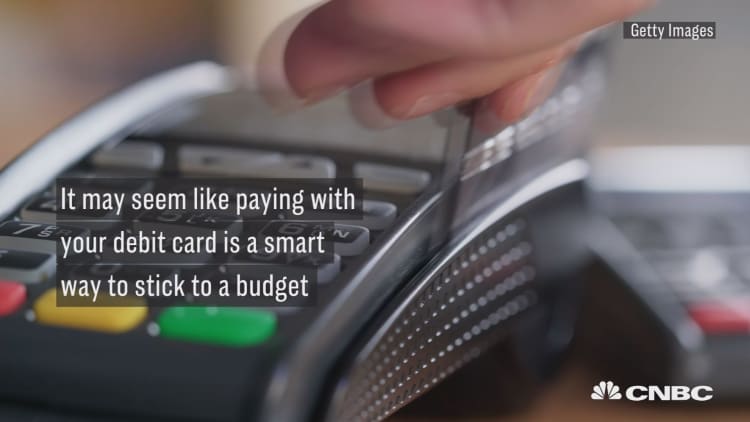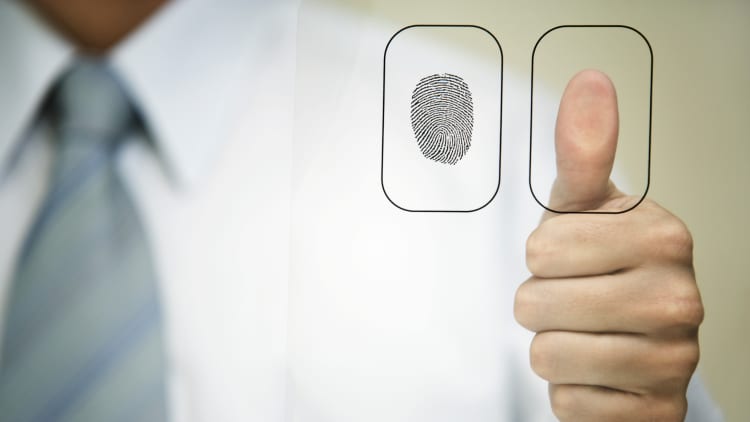
Consumers like paying with debit cards as a way to stick to a budget. For thieves, that plastic represents a lucrative spending opportunity.
In 2017, the number of debit cards compromised at ATMs and merchant card readers — typically via skimming devices that capture card data — rose 10 percent, according to a new report from data analytics company FICO. Instances of ATMs and card readers being targeted rose 8 percent, FICO said.
The increase follows two years of larger spikes in this kind of fraud, said Michael Betron, senior director of product management at FICO.
"If you look at it over the last three years, the rate of compromise has almost doubled, every year over the last three years," he said.
Skimming isn't the only tool in thieves' arsenal. In data breaches last year, 16 percent of victims had a debit card number compromised, and 3 percent, a debit card PIN, according to a report from Javelin Strategy & Research.
Here's how to make your debit card (and its associated bank account balances) less of a viable target.
Limit debit spending
Don't be so quick to pull out your debit card for an online or in-store purchase. Fraud protections on a credit card are superior to those on a debit card.
"Credit is better than debit for all transactions, because of the better consumer protections," said Paul Stephens, director of policy and advocacy for the Privacy Rights Clearinghouse.
Under the Fair Credit Billing Act, your liability for unauthorized use of your credit card is at most $50 (and most issuers will waive even that).
Debit card fraud and other unauthorized bank account transfers, meanwhile, fall under Regulation E, which determines your liability in part on how quickly you report the problem.
Banks typically have up to 10 business days to investigate. You're out the stolen cash in the meantime, which could create other problems like bounced checks or late bills, Stephens said.
"That does present a big problem for people who are living paycheck to paycheck," he said.
Spend smarter
When you do use your debit card, take steps to limit the risk that your card details will be stolen.
When possible, stick to ATMs and other purchase terminals that are located in a more secure or monitored location, said James Chessen, executive vice president of the American Bankers Association's Center for Payments and Cybersecurity. For example, use an ATM inside a bank branch versus one on the street or freestanding in a convenience store.
"[Thieves] like remote locations like gas pumps, for example, or remote ATMs," he said.
The introduction of chip card technology for debit and credit cards has stopped a lot of point-of-sale fraud, Chessen said. Use it whenever possible, rather than swiping your card.
You might scrutinize the ATM or store payment terminal to make sure "nothing looks funny," he said, but don't count on spotting a skimmer — methods and technology vary, and tampering may not be immediately obvious.
Cut off cash at risk
Be cautious about how your debit card links to your various bank accounts, said Stephens. That could give thieves access to more of your cash.
For example, your bank might allow you to connect a savings account to your debit or ATM card for ATM withdrawals, or offer enrollment in a program that automatically transfers money from savings to checking in cases where a transaction would otherwise leave you overdrawn.
A better option might be to keep your checking account balance low, and hold your savings in a different financial institution, Stephens said. You can also opt out from overdraft protection, meaning a debit transaction that would overdraw your account will be declined instead.

Watch for fraud
Monitor your bank accounts regularly to spot and report any suspected problems quickly. Depending on your financial institution, you may also be able to set up alerts for large purchases and other red-flag transactions.
"If you suspect your card's been compromised or your PIN's been compromised, we do suggest contacting the issuer," FICO's Betron said.
Acting quickly helps cut off thieves from monetizing your stolen debit card number or — if you use that same PIN as a safeguard elsewhere — prevent them from cracking other accounts.
More from Personal Finance:
You could be wasting one of the biggest benefits of the tax bill
Why stuffing your retirement savings with bitcoin may be a bad idea
Mom and Dad foot some bills for 1 in 4 millennials working full time


